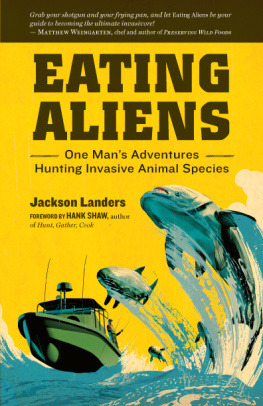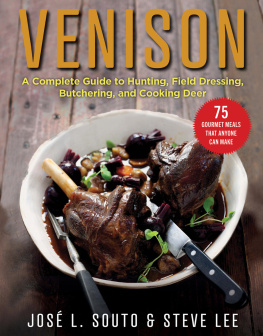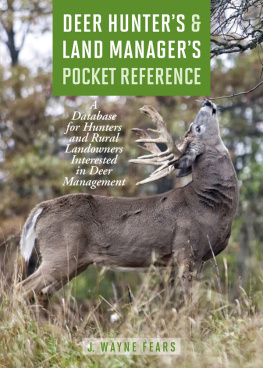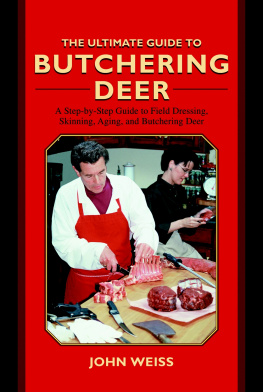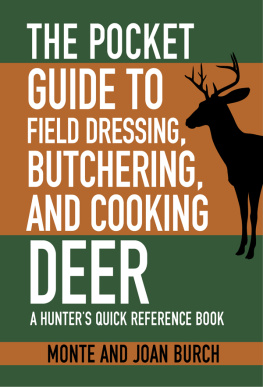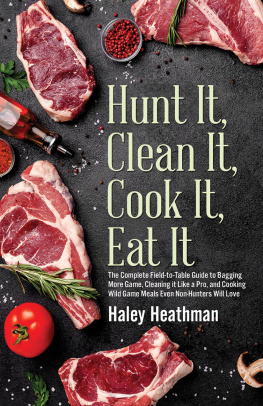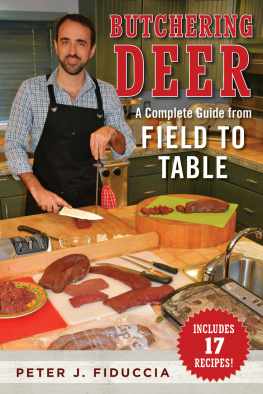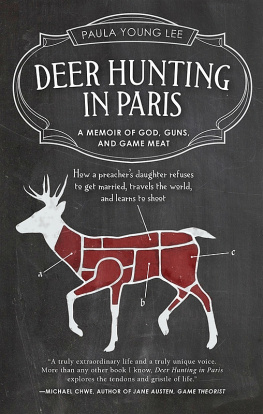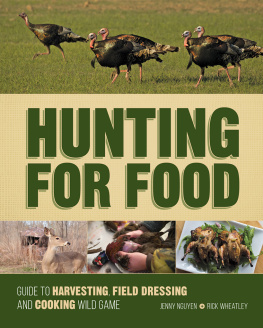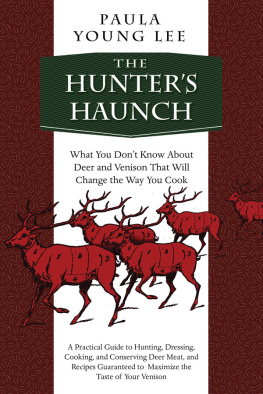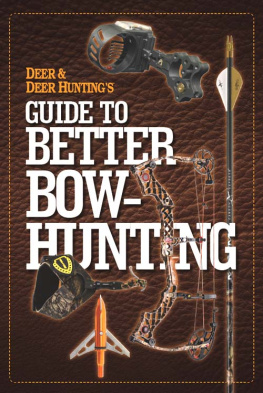THE BEGINNERS GUIDE TO
HUNTING DEER FOR FOOD
JACKSON LANDERS

The mission of Storey Publishing is to serve our customers by
publishing practical information that encourages
personal independence in harmony with the environment.
Edited by Carleen Madigan
Art direction and book design by Alethea Morrison
Text production by Liseann Karandisecky
Cover illustration by William Howell Golson
Interior illustrations by Robert Smith
Indexed by Christine R. Lindemer, Boston Road Communications
2011 by Jackson Landers
All rights reserved. No part of this book may be reproduced without written permission from the
publisher, except by a reviewer who may quote brief passages or reproduce illustrations in a review
with appropriate credits; nor may any part of this book be reproduced, stored in a retrieval system, or
transmitted in any form or by any means electronic, mechanical, photocopying, recording, or other without written permission from the publisher.
The information in this book is true and complete to the best of our knowledge. All recommendations are made without guarantee on the part of the author or Storey Publishing. The author and publisher disclaim any liability in connection with the use of this information.
Storey books are available for special premium and promotional uses and for customized editions. For further information, please call 1-800-793-9396.
Storey Publishing
210 MASS MoCA Way
North Adams, MA 01247
www.storey.com
Printed in the United States by Malloy Incorporated
10 9 8 7 6 5 4 3 2 1
Library of Congress Cataloging-in-Publication Data
Landers, Jackson.
The beginners guide to hunting deer for food / by Jackson Landers.
p. cm.
Includes index.
ISBN 978-1-60342-728-9 (pbk. : alk. paper)
1. Deer hunting. 2. Venison. I. Title.
SK301.L292 2011
799.2765dc22
2011010314
CONTENTS
Acknowledgments
My gratitude goes to Erin Bauer, without whom I never would have started to write a book. Also to Jenny McLellan Doskey, who got me over the hump. Finally to my wife, Tricia Smith, for her help all along the way, especially with the recipes.
AN INTRODUCTION TO HUNTING
You probably wouldnt be holding this book right now if you didnt intend to eat meat. There is a story behind every bite of chicken, beef, or venison, and that story began somewhere with a living creature. We should consider what that story is when we choose what we are going to eat.
We can buy factory-farmed meat at any grocery store and accept whatever were the hormones, antibiotics, diet, and living conditions that produced the most meat for the least amount of money. Or we can get fussier about the labels and seek out something that is certified as organic or grass-fed or free range. Perhaps there is a local farmer or rancher to purchase meat from directly. If you have enough land, you might even try raising your own livestock for food.
Yet there is another ready source of meat available to most people in North America. We can learn how to hunt for it in the wild or in some cases in our own backyards. Meat doesnt get much more free range than that. For the cost of some basic equipment (some of which can last a lifetime) and a little bit of education, it is possible to stop paying directly for meat altogether while eating no less of it.
The meat hunter does not need to make sense of any labels. Every deer that he or she eats is, without question, both free range and locally produced. That wild animal has almost certainly not been injected with any antibiotics or hormones. As far as humane treatment is concerned, the experience of the animal is in your hands.
I will not sugarcoat the fact that hunting means killing. When we think about hunting, our minds go straight to the kill, and we are forced to confront the inherent brutality of it. The idea of farming or ranching provides an array of other images to distract us: contented cattle standing around in a field, munching on hay. Perhaps we recall a drive through the country as children, window rolled down, face into the wind, mooing loudly at the bored cows. The pastoral imagery gives us a mental dodge around the killing; we arent able to do that with hunting. But make no mistake: farmed cattle or chickens are killed just as surely and as violently as a hunted deer. Shrink-wrapped packages of prebutchered meat at the grocery store make it easy to ignore what it is all really about. Many of us recoil slightly at the sight of pigs feet on display beside the pork chops, not because there is anything wrong with them as food, but because the sight of an actual severed foot demands that we confront what meat really is.
There are millions of us who feel bad about eating meat but not bad enough to actually stop doing it. Hunting for some or all of our own meat can be a good compromise. Hunting for food is, ethically speaking, the next best thing to being a vegetarian.
Why Hunt?
There are other very sound reasons why more people should take up hunting as an alternative to purchasing commercially raised food. Hunting can be a very good way of reducing the consumption of fossil fuels in your own life. Many people have now become aware of the concept of food miles, thanks to such writers as Michael Pollan. The term food miles describes the distance that your food and its components had to travel to reach your plate. For example, a tomato eaten in New York City in December certainly isnt very local. It may have been grown in California before being packed and shipped across the country; thats at least 3,000 food miles right there. Gasoline and diesel are what moved it to someones plate, with the attendant pollution and carbon dioxide emissions. Then figure in the petroleum used for fertilizer and the manufacturing of any packaging. The environmental impact adds up.
EATING LOCALLY
Hunting for deer is an opportunity to measure the carbon footprint of your food simply by checking your odometer on the way home from a hunt. In my own case, most of my venison is harvested literally in my own backyard and butchered in my own kitchen. Food miles = 0. I suppose you might count the carbon dioxide that I exhaled while carrying the quarters of meat into the house.
If you live in the United States, odds are that there are wild deer within 10 miles of wherever you are sitting right now. If you happen to be on the East Coast, there could very well be one in your backyard. Food doesnt get any more local than that.
EATING WELL
In many ways, deer meat is better for you than beef is. Venison contains far less fat than beef does, and while deer do put on fat, it is not marbled within the meat, the way beef fat is. Most of the fat tends to be right under the skin and is removed completely during the butchering process.
Wild venison is also as natural as meat can get. It hasnt been injected with antibiotics or hormones. It is possible to buy organic meat that has been subjected to a minimum of this kind of interference, but since the introduction of loose (rather than strict) federal standards, we have seen the practical definition of organic stretched to the point of absurdity and irrelevance.
UTILIZING NATURAL RESOURCES TO SAVE MONEY
Deer represent a means of converting land with other primary uses into a dual-use area that produces food. An area of mixed fields and forests bordering on a suburban housing development is providing natural habitat for many wild animals, housing for human beings, and recreational areas in the backyards. In the eastern United States, it is also probably producing about 8 pounds of edible venison per acre, per year. Yet most of that food is going to waste, eventually rotting by the side of the road after collisions with cars.


